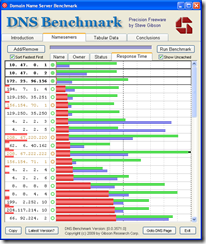by Damiaan Peeters
7. December 2009 12:53
A lot of blog posts, coming from Google have to do speed. It is all about a faster internet today. And to help you, Google announced their public DNS services.
I learned that not any statement made by major sources are true. Before, configuring the DNS settings, I downloaded a free tool called Domain Name Server Benchmark, and started 2 times a benchmark rounds. These were launched from a corporate network up with an upstream connection to COLT.

The Google public DNS servers (8.8.8.8 and 8.8.4.4) were not present in the fastest segment of the results produced by the 2 benchmarks I have launched. The only advise, apart from any possible privacy concerns, is that you shouldn’t use (any) name server without first testing its speed. There might be public facing DNS servers near you providing faster results.
by Damiaan Peeters
30. December 2008 11:33
Every tried to find out who is hosting a web site? You can't be sure, but you might get some idea when you look at the organization who supplied the IP address for the web site.
If you want a web site, you need a server and an Internet connection. To have an active Internet connection, you need of course a IP address.
The IANA delegates Internet resources to other regional organizations called a Regional Internet Registry. IANA manages also the DNS Root and information about top level domains (as country codes and .com, .org and .biz). If you ever have 2 minutes: you should read the "IANA is attacking me" page on their web site.
Like mentioned before, it is not IANA allocating the IP Addresses to your web hosting company. There are 5 regional organizations called RIRs allocating the IP addresses to your web hosting company. Currently there are 5 RIRs.
- APNIC - Asia Pacific NIC
- RIPE NNC - Europe NIC
- ARIN - American NIC
- AfriNIC African NIC
- LACNIC Latin American and Caribbean Internet Addresses Registry
Instead of performing a reverse DNS lookup, you can look up more information on one of the NIC’s web sites above to determine the owner of the "netblock" that IP is related to.